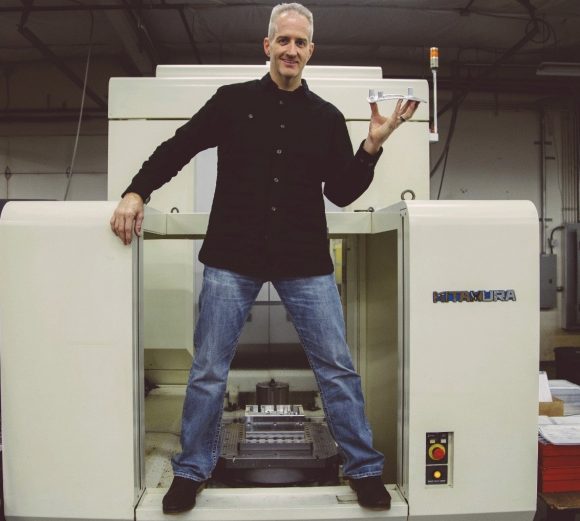Today’s guest on the podcast is Darrell Sutherland, founder and owner of Dylan Aerospace in Auburn, Washington, a Tier 1 supplier for Boeing.
Scroll down to listen to the podcast. Or listen on your phone on Apple Podcasts and Google Podcasts.
Darrell is also a professional mentor. He believes in using the Kaizen manufacturing principles for personal development as well as to improve a business. He believes in the power of mentorship so fervently that he spends over $100,000 a year on his own education.
Main Points
(3:40) Darrell talks about his personal transformation in the last decade or so. He says that for many years it was hard for him to just get out of bed because he wasn’t happy with his life, despite his success and running a business he loved.
(4:15) Darrell says growing up he looked awkward and was bullied a lot but thinks his difficult childhood prepared him for adversity later in life. He says when he was young he got into martial arts, which made him realize his passion for learning and more importantly teaching. He says he has a talent for deconstructing ideas and concepts and synthesizing them into individuals’ unique abilities.
(5:40) Darrell grew up in Washington state. His grandfather and father worked for Boeing. His father told him to never be a “number” working for Boeing.
(8:00) Darrell says his manufacturing business had been very successful and made a lot of money for a long time before he underwent his personal transformation. He was even able to take more than 10 years off from day to day operations so he would have a lot of time to raise his kids. Yet he still wasn’t content with his life as he was addicted to food and alcohol, gaining over 100 pounds. He says November of 2009 he realized that he needed to change direction, starting with his health. Darrell says it took him many years and thousands of dollars to get the guidance he needed to fix his life.
 (11:00) Darrell in the end realized that the Kaizen principles he had embraced in his manufacturing business could be applied to his own personal life. Darrell summarizes the Kaizen principles as deciding what one wants to accomplish and then analyzing and breaking it down to its root. Then a person starts making small incremental changes at the lowest level he can, and then analyzes the result at that low level. The process makes a person more aware of certain facts about his own life that he hadn’t looked at before. Then when a person can understand the roots of what the real issues are, he can understand the challenges he needs to overcome. Darrell calls his philosophy “living Kaizen,” and in his new book he writes about its parallels with the Toyota Kaizen model.
(11:00) Darrell in the end realized that the Kaizen principles he had embraced in his manufacturing business could be applied to his own personal life. Darrell summarizes the Kaizen principles as deciding what one wants to accomplish and then analyzing and breaking it down to its root. Then a person starts making small incremental changes at the lowest level he can, and then analyzes the result at that low level. The process makes a person more aware of certain facts about his own life that he hadn’t looked at before. Then when a person can understand the roots of what the real issues are, he can understand the challenges he needs to overcome. Darrell calls his philosophy “living Kaizen,” and in his new book he writes about its parallels with the Toyota Kaizen model.
(14:30) Darrell says that reshoring of manufacturing is happening quickly and we as a country need to be prepared for it. He says despite Covid-19 this is probably one of the greatest times to be in manufacturing. He says that the pandemic demonstrated to everyone that the offshoring of U.S. manufacturing during the last few decades put the United States in a terrible position in the areas of infrastructure and national security.
(15:40) Darrell says before Covid-19 he was already planning for 2020 to be a big year for his company. He says that several years ago his company started an initiative called I Love MFG. MFG stands for “Moving, Feeding, and Guarding” America and the world.
(16:55) Darrell says that young people have no connection to manufacturing. He says they don’t think about their consumer items or modes transportation that are created through manufacturing. He says with reshoring upon us he is going to devote himself to opening young people’s minds to manufacturing.
(19:30) Darrell says that people often “stumble” into the world of manufacturing rather than set out to make it their trade. He says the question we need to ask is, how do we turn people into professional manufacturing people? He says we need to analyze how people are hardwired from birth and softwired by their community and then find the lane for them in the manufacturing space. He says he interviews his employees of all levels to help them figure out their talents and find the best way they can excel at his company.
(24:30) Darrell talks about how to find mentors and why they are so important. He says mentors are important to help us to find our weaknesses so we can fix them but to find the right mentor a person has to figure out what he wants. Darrell says to look on social media for mastermind groups to locate mentors, but he warns to watch out for life coaches who haven’t already achieved anything in their lives.
Darrell says for more information about Living Kaizen people can go to his Website, darrellasutherland.com and lifeapprentaceship.com where he will be giving away a free PDF with an introduction to his program.
Question: Which self-help books have benefited you in the past?
Click here to listen on Google Podcasts.
Click here to listen on iTunes.
Podcast: Play in new window | Download



2 Comments
There are may of these books .
I read plenty, and many were uplifting, trying for you to look for purpose, realize that “We cannot hold a torch to light another’s path without brightening our own.” ~Ben Sweetland. a lot of “Its a Wonderful Life” type stories. But none that realty took me anywhere. Sort of like wetting yourself – you get a warm feeling for a little while.
That said…
The three best books that actually helped me in life are:
“The Art of the Deal” by Donald J. Trump
and
” The Total Money Makeover: Classic Edition: A Proven Plan for Financial Fitness” by Dave Ramsey
Get a positive attitude and learn about Really winning!
And get your financial matters in order.
Most importantly is having your inner self in order.
So I read a bible passage most days – it helps to keep you grounded.
Ecclesiastes 10:10
King James Version:
If the iron be blunt, and he do not whet the edge, then must he put to more strength: but wisdom is profitable to direct.
New International Version:
If the axe is blunt, and one doesn’t sharpen the edge, then he must use more strength; but skill brings success.
Even the Good Book reminds us to keep our tools sharp, and work smarter – not harder…
Stay safe!
3 that helped me beyond the warm wetness that r mentioned.
“The Sky is the Limit” by Dr. Wayne W Dyer 1980.
Read it in 1981. He looked at the world a little differently, and his message to us
was that it was okay to do exactly that.
“Getting Ahead at Work” by Gordon W Green Jr., Phd. 1989
Read it in 1989. Immediately found a new job, and set off on an interesting
career in machining, rather than working a job as a machining center operator.
(Although the view didn’t change much, the way I interpreted and dealt with it did.)
“How to Stop Worrying and Start Living” by Dale Carnegie 1944 (re-printed several times)
Read this in 1990-1991. 1 great takeaway.
In dealing with worry:
1) Figure out the worst case scenario. How bad might this problem be that worries me?
2) Decide what life might be if that happens. How will I live with the fall-out?
3) Are there things that you can do to lessen the worst case scenario, or to make yourself more ready for it when it comes? (Almost always yes)
For thirty years now, I’ve used this approach to dealing with life’s worries; not saying
it always eliminates them, but it certainly has helped.